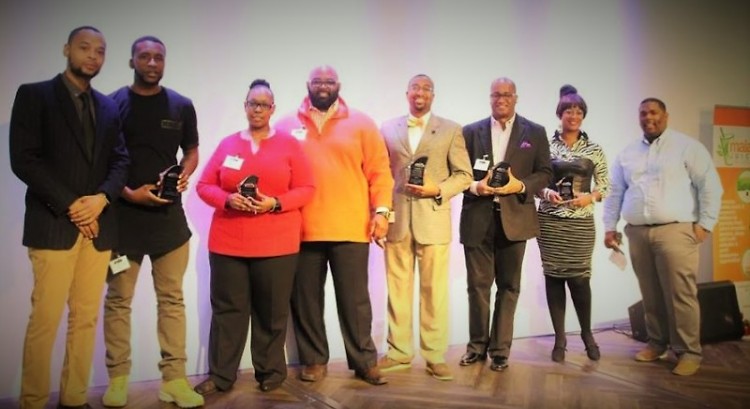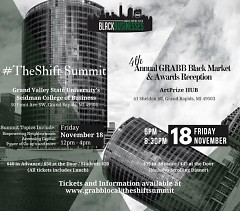Are you ready to make #TheShift? Jamiel Robinson wants to know. Robinson, founder of Grand Rapids Area Black Businesses (GRABB), is organizing #TheShift Summit, taking place Friday, November 18 at the Seidman College of Business on GVSU’s Grand Rapids campus. I spoke with Robinson at Icons Coffee Shop on Eastern Avenue, a Black-owned business, to learn more about the Summit.
Now in its fourth year, GRABB works with African-American businesses and neighborhoods on economic development, both in Grand Rapids and the outlying area. “We bring in resources to help the African-American community rise out of its current condition. In Grand Rapids currently, 45 percent of African-Americans live at or below poverty level. In certain neighborhoods that are predominantly African-American, unemployment rates are as high as 53 percent. These factors lead to things like higher infant mortality rates. I started GRABB to help address those disparities.”
#TheShift Summit will bring together community activists and work professionals with people from the neighborhoods. All are invited. “Around the community, people often have conversations over coffee or drinks about how we can improve the situation for African-Americans. I want to get people together to move that conversation into action. At the Summit we can put together strategic plans and working groups that can work in unison toward the betterment of the African-American community.”
Author Dr. Jessica Gordon-Nembhard will be the featured speaker. Author of Collective Courage, a history of Black cooperative businesses, she will speak about co-ops and incremental community development. As Robinson explains, Blacks who begin businesses typically have difficulty getting loans, and so they begin under-capitalized. Gordon-Nembhard focuses on leveraging the collective wealth in the community to start cooperative businesses that are employee-owned or invested in by people of the neighborhood.
Robinson also pointed out that the current spate of development in Grand Rapids “offers very little opportunity for individual African-American ownership. It’s more helpful when there’s an anchor business that smaller businesses can build around -- such as when Rivertown Mall came into Grandville, and smaller businesses in the community could develop around that over time.”
The Summit will end with a town hall featuring Black organizers from nearby communities, followed by an Awards Reception hosted at the ArtPrize HQ, “a celebration of those who have been doing the work at the grassroots level consistently.” The Awards Reception will also feature the Fourth Annual Black Market where at least twenty different local entrepreneurs of color will offer wares for sale and demonstrations about their businesses.
#TheShift is a hashtag that Robinson coined for “a shift in behavior, in mindset, in policy, in all the things that contribute to the condition that the African-American community find themselves in. … Any statistic that indicates success, we’re at the bottom of. How do we change that? We need a shift. From a business standpoint, #TheShift is about increasing our spending at our African-American businesses.” Robinson cited Dr. Maggie Anderson, author of Our Black Year, who estimated that “out of all Black spending, only 2 percent goes to African-American businesses. If you were to change that from 2 percent to 10 percent, just that small increase would create millions of dollars within African-American communities.” A directory of Grand Rapids Black-owned businesses is available on the GRABB website.
“We would like to see everyone involved. It requires those who are leaders of different institutions to look collectively at what’s going on in Grand Rapids. Those leaders want Grand Rapids to be on par with other world-class cities,” said Robinson, pointing out that the population of city of Grand Rapids is about 60 percent white and 40 percent people of color. “If you’re leaving behind almost half your residents, how can you be a world-class city? It’s up to us in the community to have difficult conversations on creating equitable outcomes for the residents who have endured generations of disinvestment while at the same time paying taxes. The work has to be led by local African-American communities to get at tangible, lasting outcomes.”
The Rapidian, a program of the 501(c)3 nonprofit Community Media Center, relies on the community’s support to help cover the cost of training reporters and publishing content.
We need your help.
If each of our readers and content creators who values this community platform help support its creation and maintenance, The Rapidian can continue to educate and facilitate a conversation around issues for years to come.
Please support The Rapidian and make a contribution today.


